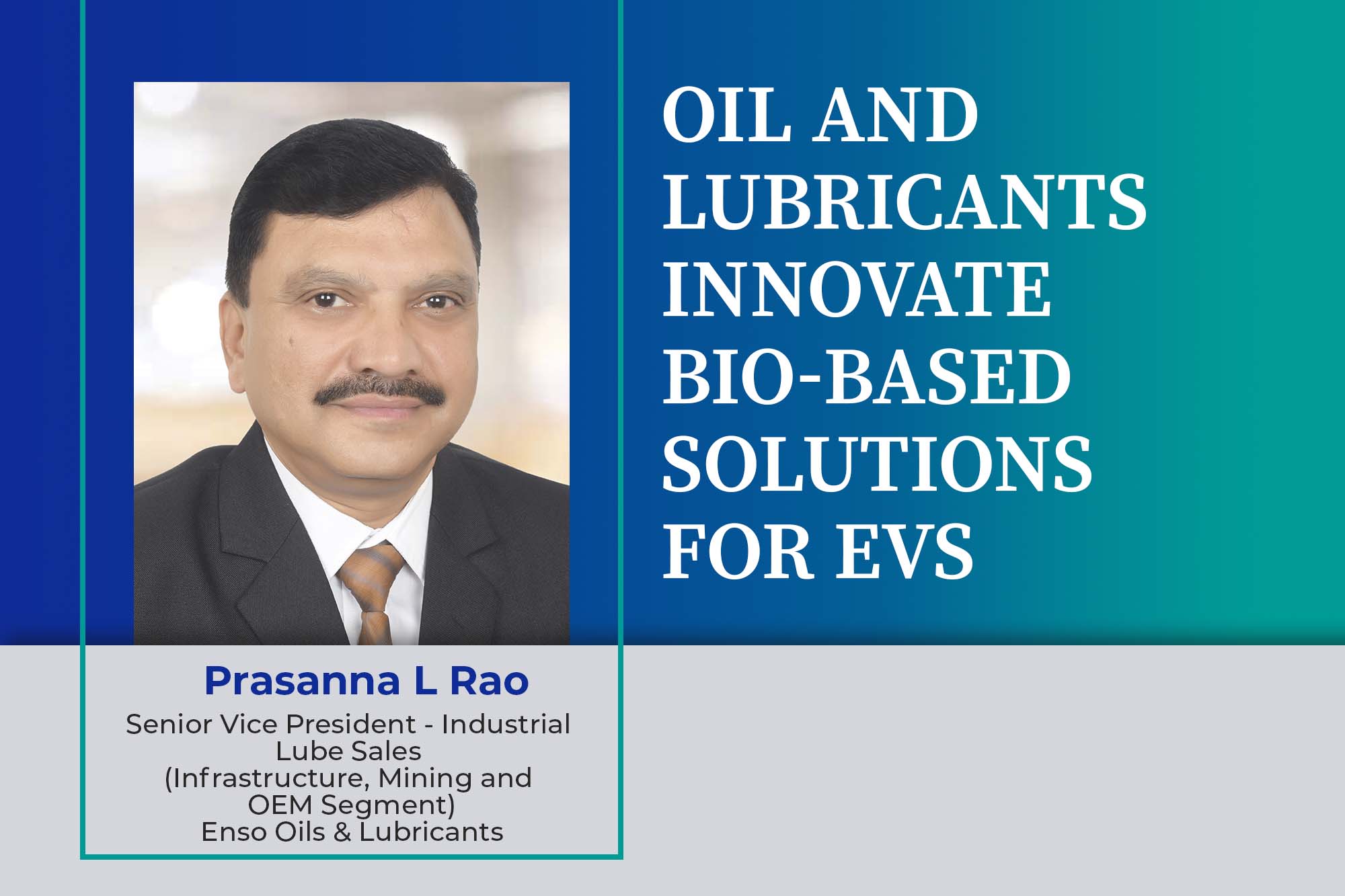Oil and Lubricants innovate with dielectric coolants and bio-based solutions for EVs
By Staff Report August 31, 2024 3:59 pm IST
Oil and lubricant facilities are innovating by developing specialised products, like dielectric coolants and bio-based lubricants, to meet the demands of emerging technologies and EVs. Prasanna L Rao, Senior Vice President at Enso Oil & Lubricants, highlights their product offerings for rapid sustainability adoption.
How do oil and lubricant facilities adapt their product offerings to accommodate emerging technologies and the shift towards EVs?
Oil and lubricant facilities are developing specialised products and diversifying their portfolios. Traditional lubricants are less relevant for EVs. Thus, facilities are focusing on new fluids like dielectric coolants for battery thermal management and specialised greases for electric motors. They also invest in R&D to create lubricants tailored to hybrid vehicles, requiring traditional and new fluids. These facilities are also expanding, producing coolants for renewable energy systems and entering the battery manufacturing supply chain. Sustainability initiatives, like developing bio-based lubricants and improving recycling processes, are prioritised to meet the growing demand for environmentally friendly products. This strategic shift allows them to remain competitive in an evolving market dominated by electrification and advanced technologies.

What industries do you cater to with a line of high-quality oils, lubricants, and technical fluids?
Enso Oils & Lubricants offers a comprehensive range of high-performance products from Gazpromneft Lubricants, Russia, for a wide range of industries with high-quality oils, lubricants, and technical fluids. The automotive industry uses these products as they require optimal performance of engines, transmissions, and other critical components.
In industrial manufacturing, hydraulic fluids, gear oils and specialised grease support precision machining and efficient machinery operation.
The construction industry provides durable lubricants for heavy equipment and machinery that operate under harsh conditions.
The energy sector, including oil and gas and renewable energy, relies on specialised fluids for cooling, lubrication, and corrosion protection in turbines, generators, and other equipment.
The commitment to quality ensures that the products enhance the efficiency and longevity of equipment across these diverse sectors.

What are the latest advancements in oil and lubricant manufacturing facilities to improve production efficiency?
Recent advancements focus on improving production efficiency through automation, digitalisation, and sustainability initiatives. Automation technologies like robotic systems and advanced sensors have streamlined production processes, reduced manual intervention and minimised errors.
Digitalisation, combined with Industry 4.0 technologies like IoT and AI, enables real-time monitoring and predictive maintenance, which improves equipment performance and reduces downtime.
Another key advancement is the adoption of modular production systems, which offer flexibility in scaling operations and adapting to changing market demands. Energy efficiency is facilitated by integrating renewable energy sources and waste heat recovery systems to reduce energy consumption. Additionally, closed-loop systems for recycling and reusing process fluids contribute to cost savings and environmental sustainability.
How does Enso Oils ensure its products exceed industry standards and deliver reliable performance?
Gazpromneft Lubricants, marketed by Enso Oils and Lubricants, follows a comprehensive approach to quality and innovation. Rigorous R&D, using state-of-the-art laboratories, formulates and tests oils and lubricants. The team of experts continually improves formulations to meet the evolving needs of various industries.We adhere to strict quality control processes, where every product batch undergoes extensive testing to ensure consistency, purity, and performance. We also maintain certifications from globally recognised industry bodies and ensure that the products meet international standards.
The use of high-quality raw materials and advanced manufacturing techniques minimises impurities. We aim to stay ahead of industry trends by incorporating sustainability practices, such as producing environmentally friendly products without compromising performance.

What initiatives have been taken by your company to improve its market presence in the oil and lubricant field and its operational capabilities?
To improve its market presence and operational capabilities in the oil and lubricant field, Gazpromneft Lubricants has implemented several strategic initiatives, including expanding its product portfolio and offering specialised oils and lubricants tailored to emerging industries. This diversification allows us to tap into new markets and meet evolving customer demands.
We also invest heavily in digital marketing and brand visibility, utilising online platforms, targeted advertising, and content marketing to reach a broader audience and strengthen the brand’s reputation. Additionally, we emphasise customer engagement through personalised services, technical support, and training programs that build confidence and trust based on the products’ performance.
What safety and environmental protection standards are pursued by oil and lubricant companies for manufacturing facilities?
Oil and lubricant companies follow strict safety and environmental protection standards to ensure safe production in manufacturing facilities. These companies adhere to international safety standards, such as ISO 45001 for occupational health and safety, and comply with OSHA to ensure safe working conditions. This includes implementing hazard control measures, proper storage, handling procedures, and emergency response plans to prevent accidents and exposure to hazardous substances.
Environmental protection is a key focus, with companies adhering to ISO 14001 environmental management standards to reduce the environmental impact of production. This involves cutting emissions and waste and recycling or reusing by-products wherever possible. Companies also develop biodegradable and eco-friendly lubricants to reduce their ecological footprint. In addition, they comply with government regulations such as the EPA’s guidelines on emissions and water contamination.
What unique features of lubricants and synthetic oils for machine tool applications make them a preferred choice for machine tools?
Lubricants and synthetic oils are preferred for machine tool applications due to their unique features that enhance performance and extend the drain period. Superior thermal stability allows these lubricants to maintain their properties under high temperatures and heavy loads, which is crucial in demanding machining environments. Excellent oxidation resistance extends the lubricant’s life, reducing the frequency of oil changes and minimising downtime.
Synthetic oils also offer enhanced lubrication properties, providing a consistent, low-friction film that reduces wear on machine components. This leads to increased precision and longer equipment life. Their high viscosity index ensures stable viscosity across a wide temperature range, maintaining optimal performance in varying operating conditions.
Additionally, synthetic lubricants often contain additives that offer specialised benefits, such as corrosion protection, cleanliness against deposits, and thermal stability. These features collectively make synthetic oils and lubricants reliable for maximising machine tool efficiency and durability.
Cookie Consent
We use cookies to personalize your experience. By continuing to visit this website you agree to our Terms & Conditions, Privacy Policy and Cookie Policy.


















